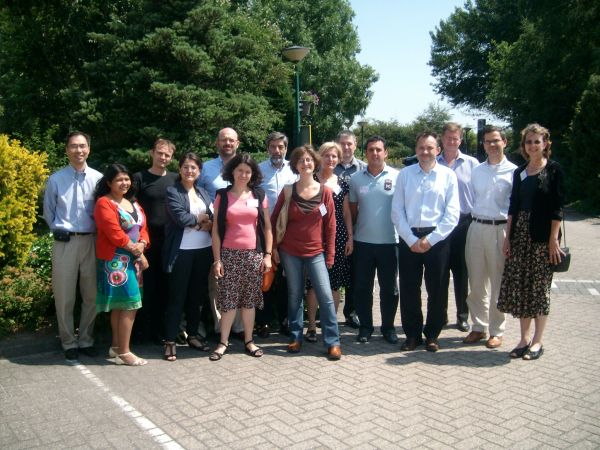Diagnosis and treatment of Co enzyme Q10 deficiency
- Number 176
- Date 12 July 2010
During the weekend of 9th to 11th July 2010 fifteen clinicians, basic scientists, and pharmaceutical representatives met in Naarden, The Netherlands. The delegates work in seven ENMC member countries and in two non-member countries. The meeting was the first ENMC workshop devoted to the most treatable subgroup of mitochondrial diseases, namely coenzyme Q10 (CoQ10) deficiency.
Background and Aims of the Workshop
Small structures present inside virtually all human cells, mitochondria produce energy to drive chemical reactions within cells. For this reason, they are sometimes referred to as the ‘powerhouse’ of the cell. CoQ10 is a small molecule that has numerous functions in the cell, including critical roles in mitochondrial energy production and antioxidant defence mechanisms. Some patients with mitochondrial disease are unable to make CoQ10 in their cells and this workshop aimed to improve the clinical recognition, diagnosis, and treatment of these patients.
Outcomes of the Workshop
During the workshop, we discussed the functions of CoQ10 in the body and how low levels of CoQ10 may disrupt these normal functions, resulting in disease. We also discussed new information about how CoQ10 is made, which may impact how we diagnose this condition in the future. We recognized the importance of accurate and rapid diagnosis of this disorder because the outcome appears to be related, at least in part, to how quickly treatment can be initiated. We therefore debated the best methods for the clinical detection and diagnosis of CoQ10 deficiency, and how precise genetic diagnoses can be achieved most rapidly and efficiently. Presentations given by clinicians during the workshop revealed the highly variable clinical features of CoQ10 deficiency; therefore, we concluded that all patients with suspected mitochondrial disease should probably be tested for CoQ10 deficiency, as well as patients with cerebellar ataxia and those with a kidney disease known as steroid-resistant nephrotic syndrome. Plasma CoQ10 levels fail to provide a measure of CoQ10 deficiency in the tissues. The apparent tissue specificity of CoQ10 deficiency also poses a challenge for diagnosis. Sampling of patient fibroblasts and muscle appear to provide a better indication of CoQ10 content, and we concluded that white blood cells should also be sampled.
We talked about cell and animal models that have been developed for CoQ10 deficiency and how these are being used to evaluate possible treatments for this disorder. We discussed the best formulations and dosage for treating CoQ10 deficiency. Our pharmaceutical partners also presented some very preliminary results of early clinical trials that are being carried out in mitochondrial disease, using CoQ10 and related compounds.
How this will Benefit Patients
As a result of the workshop we plan to develop and publish a diagnostic protocol for CoQ10 deficiency, so that clinicians and laboratories around the world can work together to identify patients with this potentially treatable form of mitochondrial disease as rapidly as possible. We will also form an international consortium to improve the genetic diagnosis and treatment of this condition.
A full report is published in Neuromuscular Disorders.(pdf)

ENMC
Lt. generaal van Heutszlaan 6
3743 JN BAARN
The Netherlands
+ 31- 35-5480481
enmc@enmc.org
We may request cookies to be set on your device. We use cookies to let us know when you visit our websites, how you interact with us, to enrich your user experience, and to customize your relationship with our website.
Click on the different category headings to find out more. You can also change some of your preferences. Note that blocking some types of cookies may impact your experience on our websites and the services we are able to offer.
These cookies are strictly necessary to provide you with services available through our website and to use some of its features.
Because these cookies are strictly necessary to deliver the website, refusing them will have impact how our site functions. You always can block or delete cookies by changing your browser settings and force blocking all cookies on this website. But this will always prompt you to accept/refuse cookies when revisiting our site.
We fully respect if you want to refuse cookies but to avoid asking you again and again kindly allow us to store a cookie for that. You are free to opt out any time or opt in for other cookies to get a better experience. If you refuse cookies we will remove all set cookies in our domain.
We provide you with a list of stored cookies on your computer in our domain so you can check what we stored. Due to security reasons we are not able to show or modify cookies from other domains. You can check these in your browser security settings.
These cookies collect information that is used either in aggregate form to help us understand how our website is being used or how effective our marketing campaigns are, or to help us customize our website and application for you in order to enhance your experience.
If you do not want that we track your visit to our site you can disable tracking in your browser here:
We also use different external services like Google Webfonts, Google Maps, and external Video providers. Since these providers may collect personal data like your IP address we allow you to block them here. Please be aware that this might heavily reduce the functionality and appearance of our site. Changes will take effect once you reload the page.
Google Webfont Settings:
Google Map Settings:
Google reCaptcha Settings:
Vimeo and Youtube video embeds:
The following cookies are also needed - You can choose if you want to allow them:
You can read about our cookies and privacy settings in detail on our Privacy Policy Page.
Privacy Policy